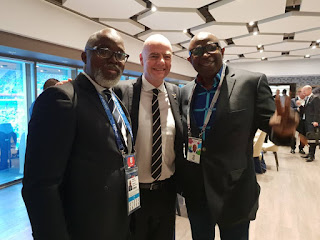Nigeria’s simmering football crisis erupted again last Monday when Sports Minister Solomon Dalung issued a statement directing the NFF to obey a Supreme Court decision of April which supposedly restored all previous orders previously issued by the Federal High Court, Jos.
Both parties return to court on July 10 for what should be the first time the substantive case will be heard.
But what is really going on, and what is the true situation of things? Colin Udoh breaks it down down as both parties return to court on July 10 to argue the substantive suit
HOW IT ALL BEGAN
To understand how this all begun, we have to go all the way back to 2006 to a familiar script now recurring with consistency since Nigeria failed to qualify for the World Cup in Germany that year. NFA chairman Ibrahim Galadima declared to a still-traumatised nation that the World Cup is “not Nigeria’s birthright” and all but sealed his fate.
In actual fact, it dates well beyond that as Nigerian Sports Ministers have routinely found ways to do away with NFA (as the body was known at the time) chairmen who grew too big for their boots.
Emeka Omeruah, Abdulmumini Aminu, Kojo Williams and Dominic Oneya have all been previous victims. Williams barely lasted three months.
But 2006 was when it really kicked off. Despite securing re-election, Galadima was hounded out of office with unproven accusations and allegations of corruption, following a battle that dragged for months.
After a series of back and forth with FIFA, the standoff resulted in a fresh election where Sani Lulu was elected NFF president.
Lulu himself suffered the same fate four years after, when he was also accused of corruption and similarly kicked out of office. Aminu Maigari was elected in his place.
It took nearly eight years before Lulu, who consistently protested his innocence, was cleared of all charges.
In 2014, it was Maigari’s turn to face the same accusations of corruption, allegations that he and his board vehemently denied.
It mattered little. Maigari was impeached, but restored to his post by FIFA which ruled that there were procedural irregularities with his impeachment.
And that is where our story begins, as is detailed here.
Christopher Giwa was supposedly elected on August 26 2014, in an election where - according to a CAS rluling - only 12 delegates out of 44 voted.
That “election” was not recognised by FIFA. Amaju Pinnick was elected on September 30 with the presence and active participation of all 44 delegates.
WHAT IS THE CURRENT SITUATION?
As detailed above, Christopher Giwa went to court claiming that he had a court order restraining the NFF from holding the Congress and election which brought in Pinnick.
The NFF argued that it was not properly served that order. The court agreed and did not indict them for contempt, but did rule that its previous order recognising Chris Giwa and his board should stand pending the determination of the main suit, effectively nullifying Pinnick’s election, until that substantive suit is argued.
Giwa then occupied the Glass House, NFF’s headquarters in Abuja. The threat of a FIFA ban, and the agreement for an out of court settlement, forced him to withdraw.
But when that out of court settlement did not materialize, Giwa’s board returned to court in February 2016 requesting the court to grant them leave to re-list the case, and all its orders.
Justice Musa Haruna granted that leave, and the case was re-listed. NFF appealed the decision, claiming it was wrong for the judge to allow the re-listing of a case which had been effectively declared dead when it was withdrawn.
Giwa’s team subsequently appealed that decision to the Supreme Court, which upheld their appeal, and directed that the case be re-tried from the beginning.
The Giwa camp claimed that ruling, restoring all the orders, gave them the authority to re-take control of the Glass House.
Although the NFF argued otherwise, Giwa’s lawyers sought and obtained an ex parte order allowing him to occupy the Glass House, which he did this week, which is where we are at the moment.
Here is a timeline of the events leading up until the NFF’s appeal.
The NFF have challenged the motion, and a hearing has been fixed for July 10.
WHAT REALLY ARE THE LEGAL ISSUES IN CONTENTION?
While there have been court orders, and appeals flying around since 2014, the fact of the matter is that the real case has not been litigated in the Nigerian courts.
Only once, at the Court of Arbitration for sport, was it litigated. Giwa, challenging FIFA’s decision to recognise Pinnick’s election and not his, lost the appeal
So the key issues to be decided are:
- Whether or not the election of August 26 which brought in Chris Giwa’s is valid or not under FIFA Statutes
- Whether the NFF Election of September 30 which brought in Amaju Pinnick and his board is valid or not under FIFA/NFF Statutes and Nigeria law
Note the key differences
Issue 1
As already determined and stated in the CAS ruling, Issue (1) will be litigated under the FIFA and and NFF Statutes. In that ruling, on page 55, para 212, CAS made it clear in throwing out Giwa’s appeal, that the case should be argued under its proper governing law, in this case, the NFF/FIFA Statutes and the NFF/FIFA Electoral Code.
FIFA however, successfully argued in the CAS arbitration suit, that according to Article 17 of its Statures, Giwa’s election was invalid because of third party involvement. CAS also determined that a quorum was not formed (page 52, para 202)
So, based on the above, it is quite clear that Giwa’s election cannot be recognised by FIFA.
Issue 2
This will be determined by a combination of Nigerian law and FIFA Statutes.
a) Nigerian Law: The issue from a Nigerian law point of view is whether or not both Congresses of September 20 and September 30, which held despite a temporary restraining Order of Court not to go ahead, is valid.
When the NFF appeared in court on October 27, 2014 to defend their case against contempt, their lawyers argued that they were not properly served the Court Order restraining them from holding the Congress and election. The judge agreed and did not convict them of contempt.
However, he did grant another temporary Order setting aside both Congresses and the elections, pending determination of the substantive suit.
This is important because for the election to stand, the NFF would need to convince the judge that because they were not served the order, both those congresses should be allowed to stand as they were held in line with the proper law governing them - which is the NFF/FIFA Statutes and Electoral Code.
If they are successful in their argument, their election will stand and life will go on.
If they are not, then that election would be nullified and fresh elections may have to be held. But Giwa will not be automatically installed as NFF president because as has already been shown via the NFF/FIFA Statutes and CAS ruling, his election was invalid according to the rules governing it.
b) FIFA Statutes/Electoral Code
In a letter to FIFA, Giwa’s lawyers argued that by Article 17 of its own Statutes, FIFA member associations are independent and should manage their affairs free of any third party interference. They point to FIFA as a third party interfering in NFF’s elections of 2014
“We make bold to state that on a proper reading and analysis of the relevant FIFA Statutes, FIFA has no power nor authority to interfere in conduct of elections of any member association such as the NFF,” they wrote to FIFA on May 2, 2018.
However, the lawyers failed to note Article G(2) of the FIFA Electoral Code, which states that
“FIFA has the right to intervene in the electoral processes of the association at any time to monitor its integrity and check that this code and the statutes and regulations of FIFA are being applied.”
That FIFA intervention in this instance was the approval given to the NFF’s letter to change the Congress of August 26, 2014 from an Elective Congress, and use it instead to draw a road map as a result of interference from Nigeria’s Sports Minister Tammy Danagogo and the SSS which arrested key NFF officials.
SO WILL FIFA BAN NIGERIA?
Not yet.
Only if the NFF board recognised by FIFA are not allowed to carry out their duties, and if they communicate that interference officially to FIFA. At the moment, that has not happened. Pinnick is in Zurich performing his legitimate duties as NFF President and as a FIFA Match Commissioner.
If the court were to rule against Pinnick and his board, and install Giwa as NFF President, that board will not be recognised by FIFA, for the simple reason that FIFA, backed by the CAS ruling, established clearly that not only was there massive third party interference leading up to Giwa’s election, the accredited Delegates who voted in that election were less than six out of 44.
A ban would almost certainly follow.
When that happens, Pinnick and his board would have to be restored before any progress can be made.












Cant wait for the final straw from FIFA
ReplyDeleteIt's obvious the problem holding Nigeria down as a country has reared its ugly head in the NFF and the obvious implode if not properly managed, is imminent
ReplyDeleteWhat's the way forward? I thought this article would have likely addressed that too. We should proffer solutions to these people as well.
ReplyDeleteI wanted to thank you for this great read!! I definitely enjoying every little bit of it I have you bookmarked to check out new stuff you post. FIFA Mobile Cheats
ReplyDeleteGreat article with excellent idea!Thank you for such a valuable article. I really appreciate for this great information.. 토토사이트
ReplyDelete